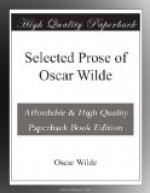His crimes seem to have had an important effect upon his art. They gave a strong personality to his style, a quality that his early work certainly lacked. In a note to the Life of Dickens, Forster mentions that in 1847 Lady Blessington received from her brother, Major Power, who held a military appointment at Hobart Town, an oil portrait of a young lady from his clever brush; and it is said that ’he had contrived to put the expression of his own wickedness into the portrait of a nice, kind-hearted girl.’ M. Zola, in one of his novels, tells us of a young man who, having committed a murder, takes to art, and paints greenish impressionist portraits of perfectly respectable people, all of which bear a curious resemblance to his victim. The development of Mr. Wainewright’s style seems to me far more subtle and suggestive. One can fancy an intense personality being created out of sin.—Pen, Pencil and Poison.
CARDINAL NEWMAN AND THE AUTOBIOGRAPHERS
In literature mere egotism is delightful. It is what fascinates us in the letters of personalities so different as Cicero and Balzac, Flaubert and Berlioz, Byron and Madame de Sevigne. Whenever we come across it, and, strangely enough, it is rather rare, we cannot but welcome it, and do not easily forget it. Humanity will always love Rousseau for having confessed his sins, not to a priest, but to the world, and the couchant nymphs that Cellini wrought in bronze for the castle of King Francis, the green and gold Perseus, even, that in the open Loggia at Florence shows the moon the dead terror that once turned life to stone, have not given it more pleasure than has that autobiography in which the supreme scoundrel of the Renaissance relates the story of his splendour and his shame. The opinions, the character, the achievements of the man, matter very little. He may be a sceptic like the gentle Sieur de Montaigne, or a saint like the bitter son of Monica, but when he tells us his own secrets he can always charm our ears to listening and our lips to silence. The mode of thought that Cardinal Newman represented—if that can be called a mode of thought which seeks to solve intellectual problems by a denial of the supremacy of the intellect—may not, cannot, I think, survive. But the world will never weary of watching that troubled soul in its progress from darkness to darkness. The lonely church at Littlemore, where ’the breath of the morning is damp, and worshippers are few,’ will always be dear to it, and whenever men see the yellow snapdragon blossoming on the wall of Trinity they will think of that gracious undergraduate who saw in the flower’s sure recurrence a prophecy that he would abide for ever with the Benign Mother of his days—a prophecy that Faith, in her wisdom or her folly, suffered not to be fulfilled. Yes; autobiography is irresistible.—The Critic as Artist.




